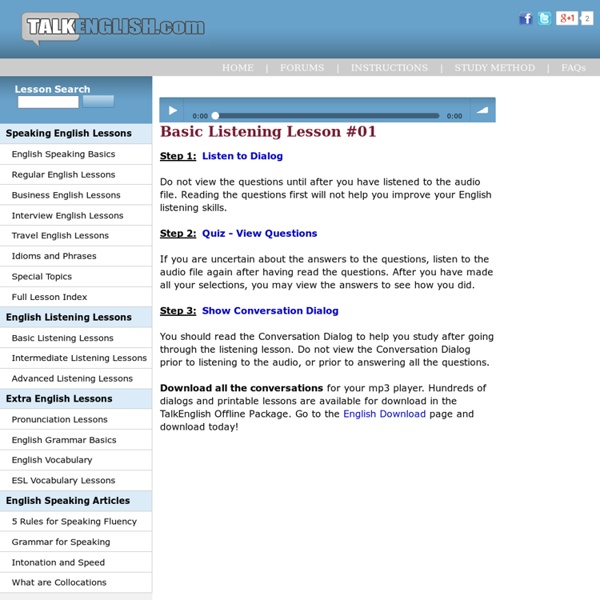



Home - World Stories ESL Listening Comprehension Exercises: Movie clips to practice English | ELL/ELT We've got many more video-based listening comprehension exercises (as well as tons of other great content) in our ad-freePREMIUM EDITION. Sign up today! Here's what you do: Click on the video you want to watch below.Watch the video, and pay attention to it! (You can pause and rewind the video.)Answer the listening comprehension questions below the video.Check your answers. Till The Hummingbird Project Silver Linings Playbook Away We Go Aftersun Tinker Tailor Soldier Spy Emergency Licorice Pizza Adventureland End of the Tour
TESOL or nothing: Unreal TV These ads, which have been recorded for a fundraising campaign for public TV in the U.S., mock reality TV and may serve as a springboard for debate in the English language classroom. If you want to use them in a conversation class, here are a few suggestions: Lead-in:Pair Ss up to talk about the questions: a) What are your favorite TV shows? Why do you like them? (If you don't like TV, why don't you?) Or... Give each S 3 blank slips of paper. Ask Ss to write the names of their 2 favorite TV shows and 2 TV shows they can't stand.Ss mingle to find someone who is very similar to them and sit next to their "TV soulmates".Listening/Viewing for gist: Tell Ss they are going to see two TV commercials to identify what they are advertising and what they have in common.Show two of the commercials and stop right before the white titles in the black background. Would you use these ads in class?
Graph words Listen A Minute: Easier English Listening and Activities English Listening Lessons Creative Guided Story Writing Jul July 10, 2013 | 2 Comments I’d like to share a guided writing activity that I adapted for my classes. Give students a card and ask them to read the instructions. Tell them they are going to invent a story about what happened to the characters on their cards. Give them the pre-prepared questions and ask them to answer the questions Tell them these questions will guide them to write their stories. You can even give them the characters from the novels or short stories. I prepared a Google document for the instructions and another for the questions and I’ll add more when I come up with an interesting idea. Note: You can prepare your cards on powerpoint slides and save them as JPEG, print and laminate them for many uses.
eLearning Blunders Blunder: a stupid or careless mistake. Alternative words: mistake, error, gaffe, fault, slip, oversight, inaccuracy, botch. This post was inspired by David Anderson’s eLearning challenge: Death, Taxes and E-Learning Mistakes. The purpose of the challenge was to highlight blunders found in eLearning courses and Articulate Community members provided many great examples of what not to do. I wanted to bring these examples together and share them here (just in case you haven’t seen the challenge). Layout: Double branding of screens. Split attention (having to combine information together to make sense of it). ‘Previous’ button on the first slide and ‘Next’ button on the last slide. Many different backgrounds. All slide space filled. No contrast. No reuse of design elements (e.g. titles are all different). Poor positioning of screen elements. Menu items in the wrong order. Terrible, eye-searing colour scheme. No way to exit a layer. Being able to click on buttons on the base layer while viewing a layer.
Listen and Write - Dictation Teaching Listening Skills: Ready to Listen, Ready to Learn Most children come to school armed with only one way to learn – listening. Almost all of us were born doing it. Indeed, for the first few years of formal education, listening is an integral part of teaching. But something happens around first and second grade, when students learn to read. Slowly the read aloud books and storytime are phased out, replaced instead by silent reading. Don’t get me wrong, there’s nothing wrong with silent reading. We spend 65-90% of our time listening and yet it’s a skill that is almost entirely overlooked in the K12 classroom. The new Common Core standards have recognized the importance of this skill. Meta Strategies How do you improve listening? There is no accurate instrument to measure listening in your first language, according to Janusik. Tell a Good Story If you tell a good story, people listen better. The storytelling on public radio is unmatched in quality. Not just for English Language Learners In Short
Come on – convince me! How to structure a professional argument. | The Business English Experience I recently taught a group of very challenging learners – scientists from a research organization who are experts in renewable energy sources. They are all highly intelligent individuals – rather intimidatingly so- and I had a great challenge in designing tasks which would meet their needs. The reason? They all play completely different roles in the organization and there is no direct overlap in the tasks they performed. After conducting a needs analysis with them – which required an extra amount of prodding and probing in order to draw out ideas of how we could structure their training, I was able to identify a number of language strategies which they all need in their roles. One very interesting point which they all raised was that they wanted to use more complex structures and speak in much more complex sentences. Here’s my take on how to prepare a convincing argument, whether it be part of a meeting, a negotiation, making sales or when dealing with conflict situations. Like this: